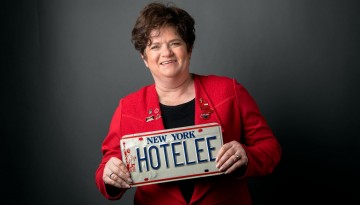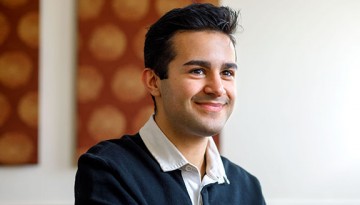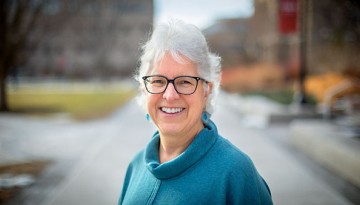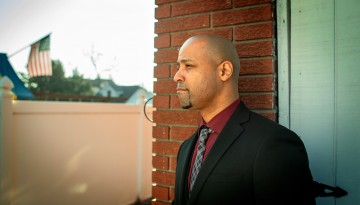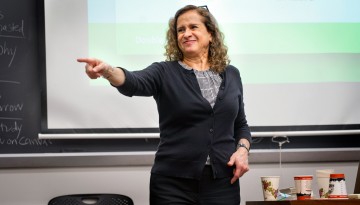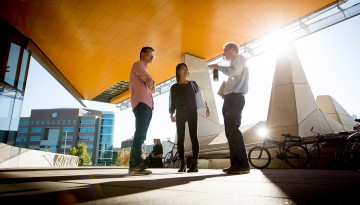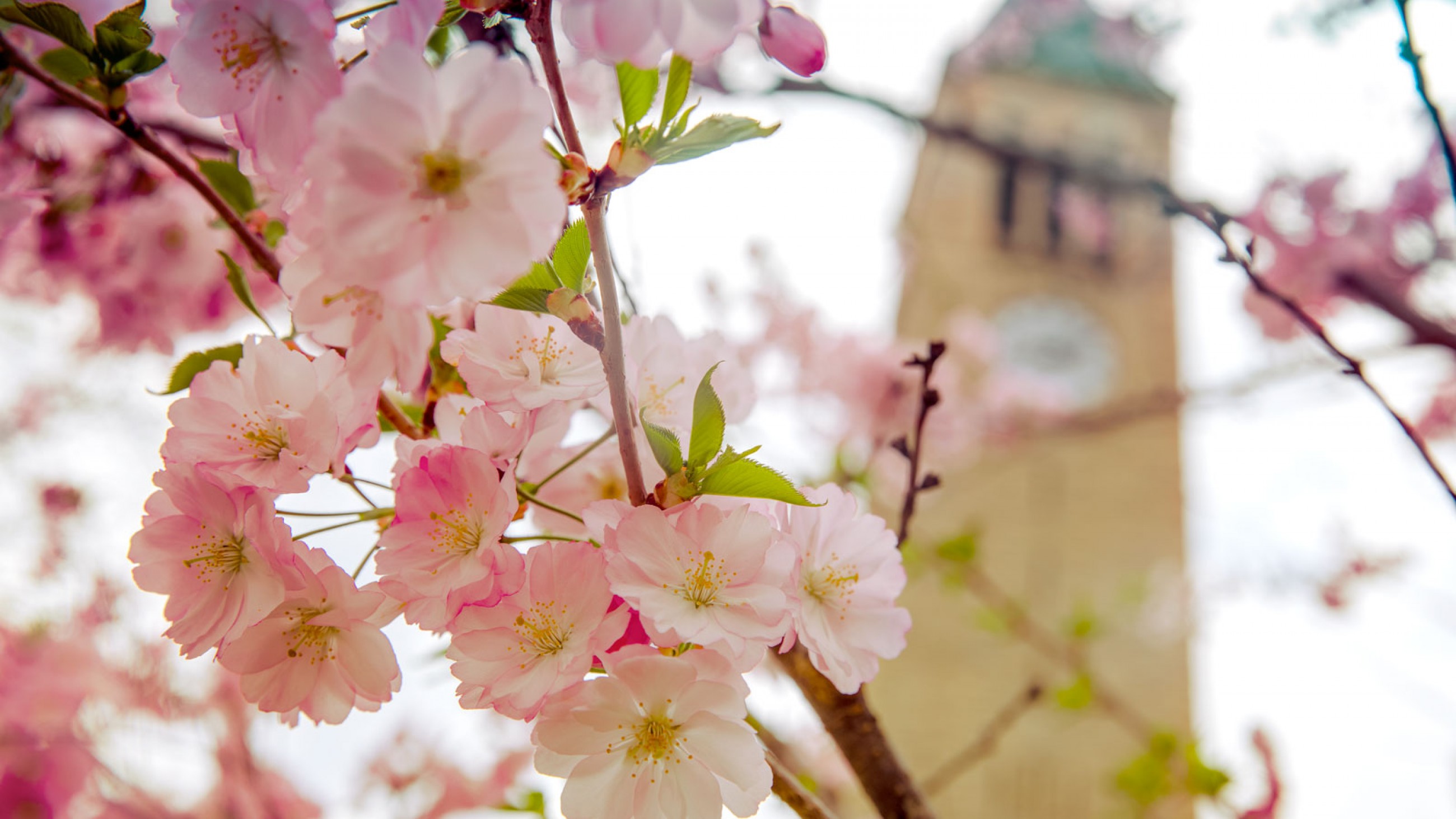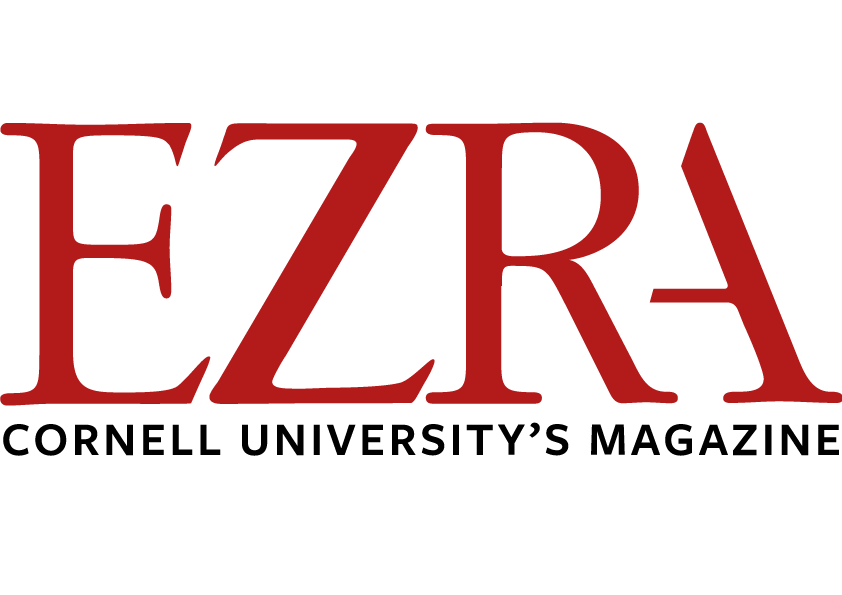
Cornell University's Magazine Spring 2020
COVER STORY
Crossing boundaries: Cornell’s thriving research ecosystem
Collaborating across disparate disciplines to tackle the grand challenges facing humanity is intrinsic to Cornell’s unique brand of research innovation.
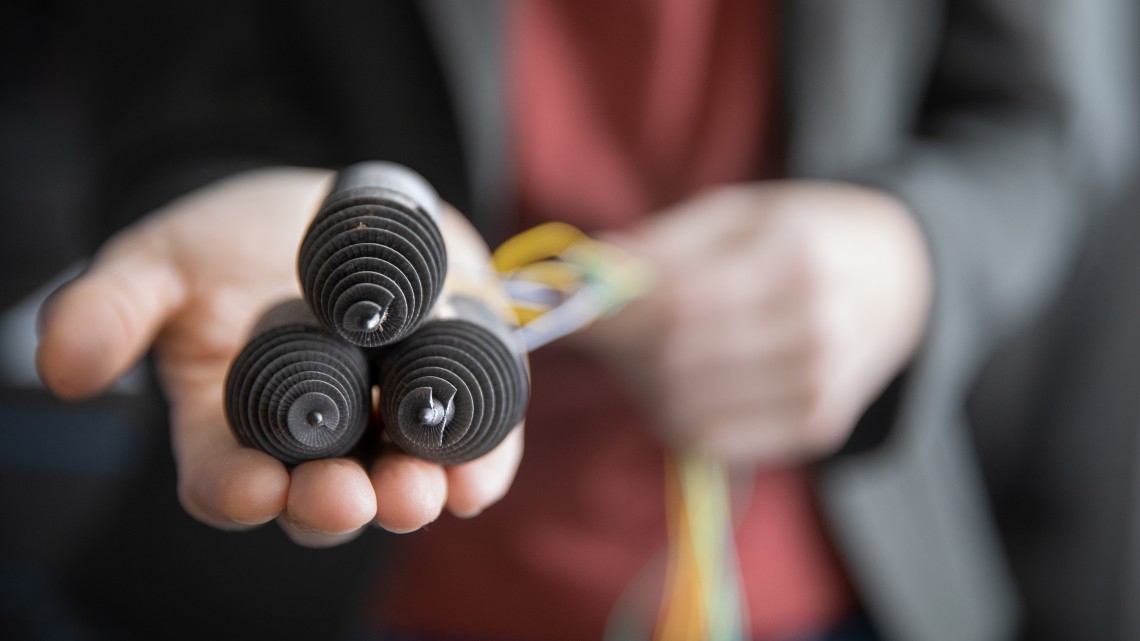
Taryn Bauerle, associate professor of horticulture, holds three of the earthworm-shaped robots that she and a multidisciplinary team developed using a biomimicry approach. The robots, which will have attached water sensors to gather information from soil, can burrow into the ground, similar to earthworms, in a more natural manner and with less disruption than shoveling.

Faculty profiles: Four new hires bring vitality to campus
Meet Wendy Ju, Denis Willett, Nika Haghtalab and Shaun Nichols, who are bringing their expertise to Cornell.

Award honors Cornellians who return home to make impact
Now in its second year, the Cornell New York State Hometown Alumni Award program has honored seven alumni.
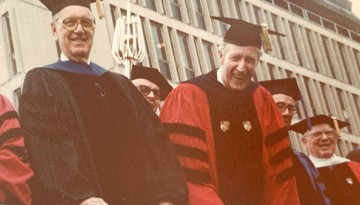
Frank H.T. Rhodes: Essential, eloquent and beloved
Cornell’s ninth president was an influential scholar, a dazzling orator and an inspiring leader who transformed the university during his 18 years at the helm and beyond. Ezra Cornell ’70 remembers his humanity.

Collection offers glimpse at era of patent medicine ads
In the 1800s, Americans were targeted with advertisements for what were often considered “cure-all” medicines, presented in colorful trade cards – now part of a Weill Cornell Medicine collection.
Also in this issue
Featured in the Cornell Chronicle
From the President

Dear Cornellians,
As I write this, in mid-March, I am sitting not in my office in Day Hall, but in my home here in Ithaca. Instead of meeting with faculty, staff and students in person, I am using chat, email and videoconferencing. Instead of looking out my window at McGraw Tower as the chimes ring out, I am watching a gentle rain fall on the trees in my backyard – the peace of the moment strangely at odds with its intensity.
Cornell’s campus, normally full of life and learning, has fallen quiet. For the moment, all instruction, and most research, have been suspended. Nearly all of our faculty and many of our staff are now working remotely; with few exceptions, our students have left campus for home, where they will complete the semester online.
This is not the way any of us envisioned the semester ending when it began, or even just a few weeks ago. Yet as each of us adjusts to our new shared reality, I am forcefully reminded of something I have seen over and over again in my time at Cornell: that our community is far larger than our physical campus. Cornell is not a place, a time or even a period in our lives. It is a community, it is an ethos and it is what unites us – now more than ever before.
These are not ordinary times for any of us. We are reeling, struggling to adapt with all the grace we can muster to a situation that just a few weeks ago was unimaginable. And across our community, we are overwhelmingly choosing to respond with resourcefulness, kindness and determination. Graduate students have rallied to help undergraduates, offering rides, storage space and even spare rooms and couches. The Student Assembly, Graduate and Professional Students Assembly, and many other campus organizations have redirected funds earmarked for now-canceled activities to Cornell’s Access Fund, which is providing grants to students struggling with the expenses of an unexpected transition. Our Division of Student and Campus Life has assisted many hundreds of students with unique and complex situations: those who cannot afford to return home, those who have no home to go to, those who are unable to travel because of government restrictions. The logistics of residence hall move-out – a mammoth operation that is usually meticulously planned and carefully orchestrated over many months – were put into place with lightning speed, including options for students to store items until their return. In the space of two weeks, our teaching faculty, aided by our remarkable Center for Teaching Innovation, moved to adapt their classes to online teaching – reaching out to support students in their transitions while negotiating their own. Our campus may be empty, but our teaching, our learning and – most importantly – our community carry on.
I am so inexpressibly proud of everyone – students, staff, faculty, families – making all of that possible, despite their own anxieties, their own disappointments and the disruption to their own lives. I am particularly proud of and inspired by our faculty at Weill Cornell Medicine in New York City who are working tirelessly on the front lines of this crisis, and equally proud of the many alumni who are doing the same. And I am so grateful to all of you who are rising to this unprecedented challenge with courage, creativity and compassion.
As our alumni know so well, we do not stop being Cornellians the moment we leave campus. Our identity, our community and our Cornell ethos are stronger than that. Until we are together again, wherever there is a single Cornellian learning, growing and creating – that is where Cornell will be.
My very best to all of you.

Martha E. Pollack
President
president@cornell.edu
About this issue
Welcome to this special online edition of Ezra magazine.
This spring, our students and staff took quick, necessary action to study and work remotely while our faculty and staff adapted to deliver the remainder of the semester’s coursework online.
In turn, staff in Alumni Affairs and Development and University Relations, who collaborate to produce Ezra magazine, made the decision to move the spring 2020 edition to this online format. This is an experimental way to publish the magazine, and it helps us with immediate savings on printing and mailing costs at a time when stewarding university resources is critical.
We hope you enjoy this issue of Ezra, and we welcome your thoughts about the magazine. Please submit your feedback here.
Vice President, University Relations
Vice President, Alumni Affairs and Development
You can make it happen!
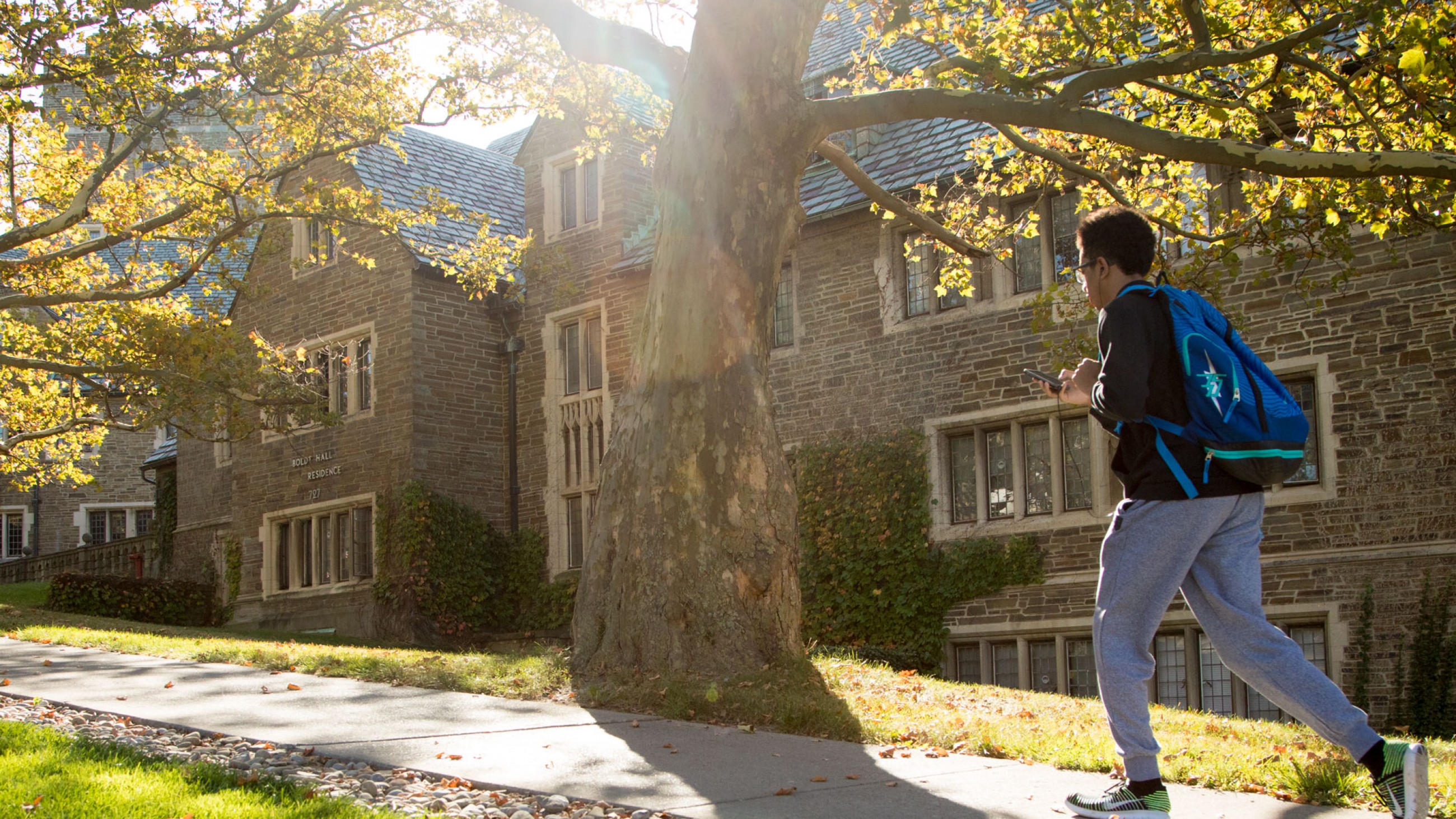
While the full impact of COVID-19 is still unknown, already it has significantly disrupted the lives of our students. Help address the most urgent needs of our students experiencing financial hardship. Make a gift to one of these three critical areas:
Access Fund: Emergency resources for students
Helps to cover emergency expenses not covered through financial aid or other university resources including helping transition to a virtual learning environment, travel and other related emergency costs.
Cornell food pantry
Provides free, confidential access to food and personal care items to Cornell undergraduate and graduate students in need.
Student and Campus Life annual fund
Right now, annual fund dollars are more valuable than ever as we address known needs and anticipate what may come. Annual fund dollars are flexible and can be directed to any area within Student and Campus Life.
About Ezra
Vol. XII, Issue 2, Spring 2020
Produced by the Cornell Chronicle, AAD Communications and Brand Communications.
- Publisher: Joel Malina, Vice President, University Relations
- Managing Editor: Joe Wilensky, University Communications, University Relations
- Contributing Editor: Laura R. Hunsinger, Alumni Affairs and Development
-
Ezra Editorial Board:
John Carberry, Senior Director of Media Relations and News, University Relations
Karen Walters, Senior Director for News, University Relations
Shane Trost, Senior Director for Brand Communications, University Relations - Lead Designer and Project Manager: Clive Howard
- Web Designer: Meghan Horton
- Photography: Matthew Fondeur, Lindsay France, Jason Koski
- Contributors: Kate Blackwood, Ezra Cornell ’70, Louis DiPietro, Kathy Hovis, Laura Hunsinger, Susan Kelley, Barbara A. Knuth, Melanie Lefkowitz ’95, Nicole Milano, Leslie Morris, Kaitlin Provost, Rebecca Snyder, Jana Wiegand, Joe Wilensky
Diversity and inclusion are a part of Cornell University’s heritage. We are a recognized employer and educator valuing AA/EEO, protected veterans, and individuals with disabilities.
Subscription information: ezramagazine@cornell.edu or call 607-255-3630.
